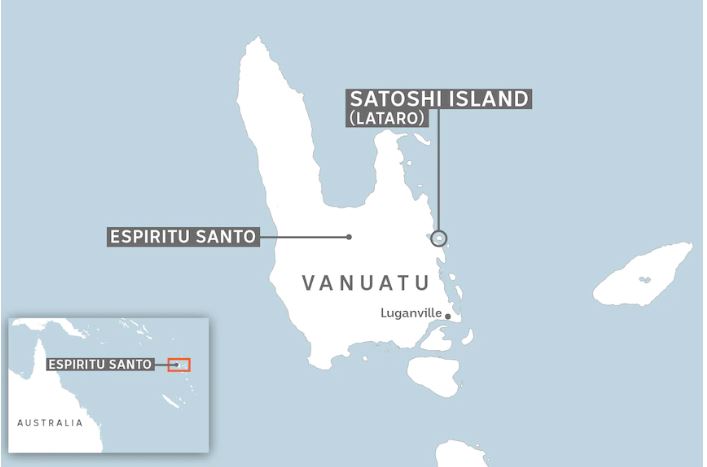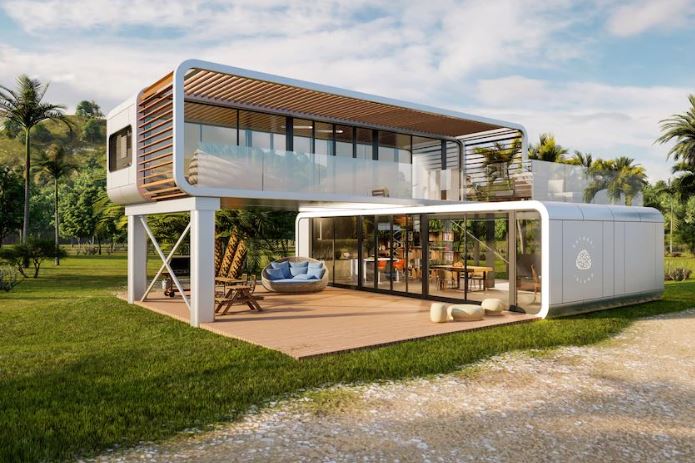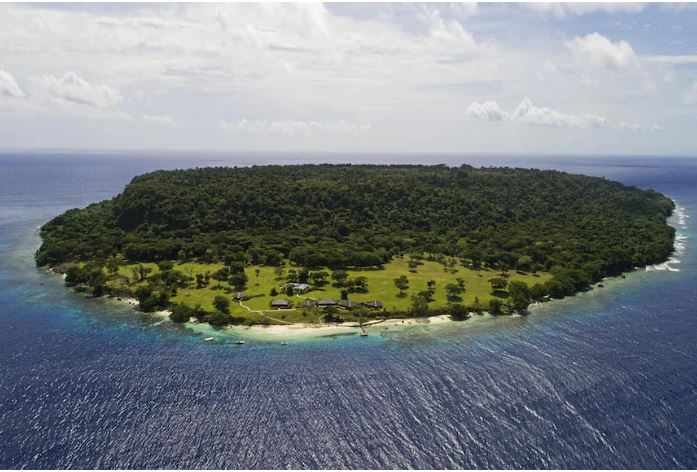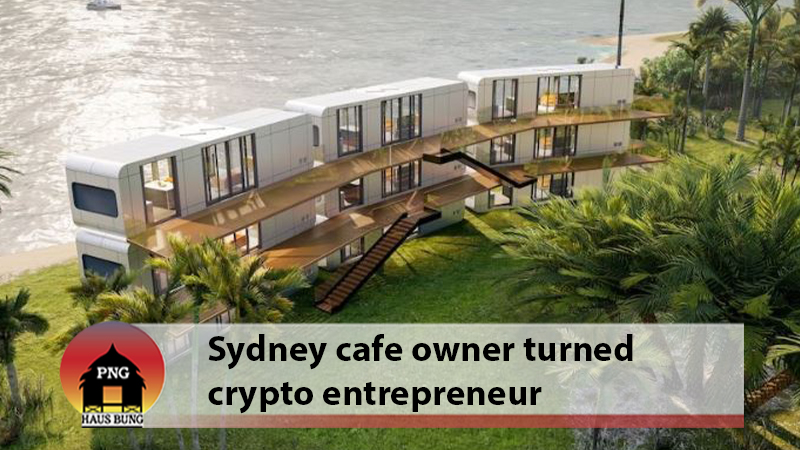The proposal was ambitious: to turn a remote, overgrown Pacific island into a private city, built entirely on cryptocurrency.
People buying real estate on the island wouldn’t get traditional land deeds. Instead they would receive digital non-fungible tokens (NFTs), which have more famously been used to certify artwork.
“One day I got contacted, and [was asked]: ‘Hey, would you be interested in running operations? We’ve got this great idea’,” Mr Troyak said.
Mr Troyak was hooked. Without visiting Vanuatu where the project would be based, he agreed, becoming the project’s logistical director and spokesperson.

Earlier this year, Mr Troyak shut his busy Surry Hills cafe and moved to the Pacific country of Vanuatu to live and work full-time on Satoshi Island.
The project is named after Satoshi Nakamoto, the pseudonym used by the creator of the digital cryptocurrency, Bitcoin.
For those steeped in the world of cryptocurrency, Satoshi Island is a fantasy coming to life, a revolutionary experiment to create a new, decentralised society built entirely on cutting-edge technology.
The team behind it are committed to making that dream a reality.
Ardent supporters have already snapped up plots on the remote island using cryptocurrency, buying “Land Deed NFTs” stored on the blockchain.
However, with a litany of logistical and legal hurdles between the vision for Satoshi Island and its reality, experts say investors need to be wary, and fear the project may eventually fall flat or run foul of local laws.
A crypto island experiment
The company’s slick website promises Satoshi Island will soon transform into a high-tech city, built from the ground up by a global community of cryptocurrency enthusiasts.
Hundreds of families are set to live in oblong, modular homes, stacked on top of each other like massive glass Lego blocks by the sea.
Their goal is for every aspect of people’s lives to be mediated by cryptocurrency.
Coffee and rent could be paid for with digital currencies like Bitcoin and Ethereum.
Cryptocurrency startups are being encouraged to buy land to create a commercial centre for the digital economy.
Proponents such as Satoshi Island’s architect, James Law, said it could be a real-world case study for what a future community might look like, governed entirely online by the blockchain.
“I think we are very brave entrepreneurs who are putting our skills and resources into the project, earnestly trying to make it into something truly special,” he said.

Most countries, including Vanuatu, don’t recognise digital currency as legal tender, nor do they have regulations to oversee crypto markets, which are notoriously unstable, making it risky to trade or invest in them.
However, Satoshi Island is attempting to remove many barriers to crypto trading.
Instead of national banks, politicians or courts controlling the community, the company hopes to use blockchain — a technology that can store information without risk of it being changed, hacked or corrupted — to ensure money or property isn’t stolen.
‘Doesn’t stand up to scrutiny’
It sounds utopian, and for sceptics like software engineer and prominent cryptocurrency critic Molly White, that’s the point.
She said Satoshi Island was just one in a “long line” of naive cryptocurrency projects set on tropical islands.
“There’s been a lot of energy and money put into convincing people that this is the future of technology, the future of the web, the future of society,” she said.
“A lot of that really just doesn’t stand up to scrutiny. But it does work very well for convincing people to put their money into it.”
Ms White said “less-glamorous” aspects — such as waste management on a remote island, food distribution and even electrification — were not considered in many crypto island plans.
Blockchain as an ‘exit from nation states’
Ellie Rennie, from RMIT University’s blockchain innovation hub, said there was potential for blockchain technology to re-imagine how societies might operate.
“They’re often talking about the possibilities of automating certain functions of the state,” Professor Rennie said.
“Many of those tasks can be done through technologies more efficiently and, so, that raises the possibility of alternative societies forming and alternative nations.”
However, she added, it was “too early” to predict if any of the proposed cryptocurrency utopias would work, and with that uncertainty there was risk.
“In some cases, they are experiments in doing things differently. They’re a form of exit from nation states,” she said.
“The problem is that others can pick up on these narratives and hopes and ideologies and exploit them for financial gain.”

Private land sales ‘not possible’
At the moment, the island — called Lataro by locals — is an unruly, tropical forest.
It’s about 800 acres, a bit bigger than Sydney’s CBD, and “90 per cent untouched by man”, according to a real estate notice advertising the island.
The island is mostly uninhabited, but a family of Indigenous landowners have ultimate custody of the land, and can lease it out to companies such as Satoshi Island to develop and use.
Philip Warele negotiated the deal with Denys Troyak and the Satoshi Island company.
He does not know much about cryptocurrency but is optimistic about the opportunities that Satoshi Island offers.
“We knew it would improve the economy of Vanuatu and bring money into the country,” he said.
Mr Troyak and the team have employed around 10 members of his family, and Mr Warele says another 10 will join the team soon.
The company also made payments to Mr Warele’s family — another reason why he says he is happy for the partnership.
As to whether Satoshi Island investors can buy physical property with cryptocurrency, Mr Warele said that would be impossible.
“My understanding is that they’re not selling plots, but they’re just renting out the plots,” he said.
“There’s one man who has paid for a lease, so we have an agreement with him. But, for him to sell land inside the island, that’s not possible.”
Mr Troyak told the ABC “one cannot own land in Vanuatu” and “NFT holders have exclusive rights to the blocks of land on Satoshi Island”.
But he did not elaborate on why the company’s website and promotional material states “anyone can own a piece of the island”.
Is it a scam?
Although they don’t give any property rights to customers, the asking prices for Satoshi Island Land NFT Deeds range from $900 to $11,000.
In January, the Vanuatu Financial Services Commission (VFSC) issued a public notice which said the operation “could be a scam”.

The financial services regulator said that, because Satoshi Island did not have a licence to trade in digital assets, what it was advertising online was false and misleading.
A few months later, Satoshi Island claimed the notice was damaging to their business and took legal action against the commission.
VFSC said it had to remove the notice while the case was pending, and that the matter was still before the Vanuatu courts.
Mr Troyak did not respond to ABC’s questions about why his company took legal action against the VFSC.
In February, Vanuatu’s acting financial minister, Johnny Koanapo Rusao, told the ABC he supported Satoshi Island in principle, but said that Vanuatu’s legislation needed to be updated to provide adequate oversight on the project.
“We need to have legislations updated so they can absorb the implementation of the cryptocurrencies,” he said.
Mr Troyak said Satoshi Island’s legal team were ensuring the project would be lawful.
“We feel very strongly that the legislations of the Vanuatu government will come through, and it’s going to be friendly to us,” Mr Troyak said.
“We’re going to make sure we go through to our lawyers locally, and make sure everything is clear.”
Professor Rennie said there was a “clear precedent” of cryptocurrency schemes making promises they they could not fulfil, and urged potential investors to be cautious.
“There’s a very fine line between a scam and a failed business project,” she said.
“Ultimately, it’s up to anyone who is interested in participating in these things to look very, very closely at what they think it is, and to know the risk.”
‘Flexible’ laws and murky ownership rights
According to Vanuatu’s land management department, Mr Troyak and his team do not have the rights to Lataro Island.
In lease title documents obtained by ABC, the Satoshi Island company is directed by Theresa Jane Allen, a long-time property developer in Vanuatu.
The ABC was unable to contact Ms Allen, and her name is not listed on Satoshi Island’s website, promotional material, nor on any of the company’s NFT land agreements.
Mr Troyak said Ms Allen was “not part of the Satoshi Island team”, and said Satoshi Island’s Land Deed NFTs were sold by another organisation, registered as a non-profit in the Marshall Islands.
He did not answer questions about who financially benefits from the Satoshi Island project.
Despite lack of clarity around the company’s ownership, legal experts say it is unlikely the company would face barriers in Vanuatu’s courts.
Vanuatu lawyer Didier Hamel-Landry said that, as long as investors were clear they could not buy Vanuatu land using NFTs, Satoshi Island’s activities were lawful.
“In Vanuatu law, there’s enough flexibility in the legal system and in the rules for such a project to go ahead and to exist,” Mr Hamel-Landry said.

Compared to countries such as Australia, Mr Hamel-Landry said Vanuatu did not have robust tenant, property or foreign investment rights.
Instead, he said, land agreements — such as the one with Satoshi Island — were made personally between customary landowners and developers.
“It doesn’t guarantee that it’s a good idea and a sound investment, of course … My advice to anyone investing in that particular project, or any project generally, would be to make serious due diligence and look at who they’re dealing with,” he said.
Supporters undeterred
Ms White said underdeveloped property laws could be the reason why cryptocurrency enthusiasts experimented in countries like Vanuatu.
“The reason that they want to do this in some remote island versus in London or New York City or someplace that is fairly established already, is that they want to create basically a micronation, where they can create their own rules,” she said.
“I think the majority of people who are actually putting money into these projects are speculating … are hoping to flip the NFTs, based on news coverage.”
Satoshi Island is one of a number of blockchain and cryptocurrency experiments in the Pacific.
In Fiji, a similar cryptocurrency “paradise” called Cryptoland was attempted but, after being widely mocked, the project eventually ran aground for failing to secure the island.
Despite these concerns, some of Satoshi Island’s supporters remain undeterred.
Monty Metzger — founder and chief executive of a blockchain platform called LCX — has long been a fan of Satoshi Island.
“Participating in Satoshi Island is a fun thing. I want to learn how they are doing it, and I want to see how much interest it will gain,” he said.
“I’m always skeptical, but I’m also enthusiastic … I also would not put my life savings into it but rather participate, like being part of a club.”
Source: ABC Pacific News

